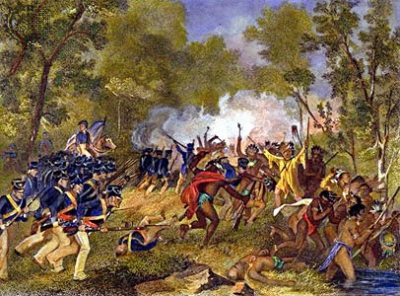The Battle of Tippecanoe ( TIP-ee-k-NOO) was fought on November 7, 1811, in Battle Ground, Indiana, between American forces led by then Governor William Henry Harrison of the Indiana Territory and Native American forces associated with Shawnee leader Tecumseh and his brother Tenskwatawa (commonly known as "The Prophet"), leaders of a confederacy of various tribes who opposed European-American settlement of the American frontier. As tensions and violence increased, Governor Harrison marched with an army of about 1,000 men to attack the confederacy's headquarters at Prophetstown, near the confluence of the Tippecanoe River and the Wabash River.
Tecumseh was not yet ready to oppose the United States by force and was away recruiting allies when Harrison's army arrived. Tenskwatawa was a spiritual leader but not a military man, and he was in charge. Harrison camped near Prophetstown on November 6 and arranged to meet with Tenskwatawa the following day. Early the next morning warriors from Prophetstown attacked Harrison's army. They took the army by surprise, but Harrison and his men stood their ground for more than two hours. After the battle, Harrison's men burned Prophetstown to the ground, destroying the food supplies stored for the winter. The soldiers then returned to their homes.
Harrison accomplished his goal of destroying Prophetstown. The win proved decisive and garnered Harrison the nickname of "Tippecanoe". Meanwhile, the defeat dealt a fatal blow for Tecumseh's confederacy and, though comeback attempts were made, it never fully recovered. So popular was Harrisons nickname that the Whigs turned "Tippecanoe and Tyler too" into the slogan and a popular song for Harrison and his running mate John Tyler's 1840 presidential campaign.
Tecumseh's War or Tecumseh's Rebellion was a conflict between the United States and Tecumseh's Confederacy, led by the Shawnee leader Tecumseh in the Indiana Territory. Although the war is often considered to have climaxed with William Henry Harrison's victory at the Battle of Tippecanoe in 1811, Tecumseh's War essentially continued into the War of 1812 and is frequently considered a part of that larger struggle. The war lasted for two more years, until 1813, when Tecumseh and his second-in-command, Roundhead, died fighting Harrison's Army of the Northwest at the Battle of the Thames in Upper Canada, near present-day Chatham, Ontario, and his confederacy disintegrated. Tecumseh's War is viewed by some academic historians as the final conflict of a longer-term military struggle for control of the Great Lakes region of North America, encompassing a number of wars over several generations, referred to as the Sixty Years' War.

1811Nov, 7
Tecumseh's War: The Battle of Tippecanoe is fought near present-day Battle Ground, Indiana, United States.
Choose Another Date
Events on 1811
- 5Mar
Battle of Barrosa
Peninsular War: A French force under the command of Marshal Victor is routed while trying to prevent an Anglo-Spanish-Portuguese army from lifting the Siege of Cádiz in the Battle of Barrosa. - 5May
Battle of Fuentes de Oñoro
In the second day of fighting at the Peninsular War Battle of Fuentes de Oñoro the French army, under Marshall André Masséna, drive in the Duke of Wellington's overextended right flank, but French frontal assaults fail to take the town of Fuentes de Oñoro and the Anglo-Portuguese army holds the field at the end of the day. - 16May
Battle of Albuera
Peninsular War: The allies Spain, Portugal and United Kingdom, defeat the French at the Battle of Albuera. - 7Nov
Battle of Tippecanoe
Tecumseh's War: The Battle of Tippecanoe is fought near present-day Battle Ground, Indiana, United States. - 28Nov
Piano Concerto No. 5 (Beethoven)
Beethoven's Piano Concerto No. 5 in E-flat major, Op. 73, premieres at the Gewandhaus in Leipzig.

 English
English  español
español  français
français  português
português  русский
русский  العربية
العربية  简体中文
简体中文 